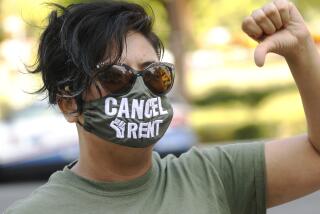Broader Curfew Powers Enacted : Law enforcement: The ordinance expands police authority to arrest violators. It comes in response to a court ruling that could hamper the LAPD response to riots or other emergencies.
Concerned that a recent court ruling could hamper police response to riots or other emergencies, the Los Angeles City Council on Wednesday passed an ordinance that expands the power of police to arrest curfew violators.
The City Council unanimously reasserted the special emergency power of police to arrest those out after dark, but also asked Police Chief Willie L. Williams to draw up a policy to prevent arrests of those who have legitimate reasons to break a curfew.
“We do not wish to compromise the most effective form of law enforcement in times of crisis,” said Councilman Mark Ridley-Thomas in advocating a curfew arrest policy. “But the ordinance also raises significant concerns vis-a-vis civil liberties.”
Mayor Tom Bradley signed the ordinance immediately and his office later issued a statement saying that he will work with other city officials to assure that any future curfew is implemented fairly.
The City Council’s action was provoked by an appellate court ruling earlier this month that said police had exceeded their authority during last spring’s riots when they arrested three people who were merely walking on the street or sitting in their cars after dark.
The court’s decision threw into doubt the validity of thousands of other riot curfew arrests, because the court said police were not allowed under the existing ordinance to simply arrest everyone out after dark. They had to pick up only those who threatened to “imperil lives or property or prevent, hinder or delay” police or fire crews, under the court’s interpretation.
On Wednesday, the City Council effectively removed all those conditions, which had been part of the city’s Administrative Code. Now, violating a curfew order is a misdemeanor under any condition, punishable by up to a $1,000 fine and six months in jail.
“We have got to give the Police Department the tools it needs to defend this city,” said Council President John Ferraro, arguing that the police should have wide discretion.
The council action came amid widespread concerns about possible further unrest because of two emotionally charged trials--the federal prosecution of police officers in the beating of Rodney G. King, and the case of the young men charged with assaulting trucker Reginald O. Denny and others as the spring riots started.
While joining the unanimous vote for the broader curfew, Councilmen Mike Hernandez and Ridley-Thomas also expressed concern that many people were unnecessarily arrested last April and May. They noted that the vast majority of curfew arrestees were black or Latino, including many who were going to work or other legitimate destinations.
The council disagreed as how to best address the question of civil liberties.
Hernandez and Ridley-Thomas called on Williams to draw up a specific list of exemptions to the curfew--allowing travel after dark for those who are homeless, have medical emergencies or are traveling to work.
But Police Department officials objected that such a list could make enforcement a headache.
“If someone says they are going to work, you don’t have time to call their boss and see if they are,” said Deputy Chief Bayan Lewis. The list could “prevent an officer from exercising his best judgment or it can become a defense in any subsequent prosecution.”
After extended debate, Hernandez and Ridley-Thomas agreed that Williams and the department should draw up a more general policy statement to guide arrests under any future curfew. The City Council will review the policy in the next few weeks.
Hernandez said that by raising the issue, he had already accomplished his goal of sensitizing the police to unfairness of making blanket arrests.
But Ridley-Thomas and a spokesman for the American Civil Liberties Union Foundation of Southern California said they will withhold judgment until they see the chief’s policy proposal.
At the request of Hernandez and Ridley-Thomas, the City Council on Wednesday also initiated plans to make future curfews less onerous on the homeless and non-English speakers.
A committee of foreign language media, under the auspices of the mayor’s office, will draw up a plan for notifying those who don’t speak English about future curfews. Such notices were haphazard last spring, leading to ignorance or confusion about the curfew in immigrant neighborhoods, Hernandez said.
Also, the city’s Community Development Department will work on a plan for housing the homeless during any curfew, so they can stay off the streets. In preliminary discussions, city officials have proposed moving the homeless to the same shelters that they use in cold and wet weather.
Hernandez said that plan could work, although some alternatives might be needed because many of the homeless are now sent to National Guard armories. In last year’s riots, those buildings were filled by guards who were on emergency duty in the city.
More to Read
Sign up for Essential California
The most important California stories and recommendations in your inbox every morning.
You may occasionally receive promotional content from the Los Angeles Times.











